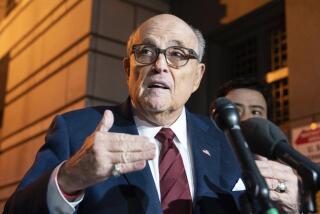McNall Goes Into Bankruptcy : Finance: A year after he is owner of a Stanley Cup finalist, creditors take him to court, where he enters into Chapter 11.
- Share via
Bruce McNall’s deteriorating financial condition culminated Friday in an agreement whereby he reluctantly agreed to enter bankruptcy proceedings.
The action, taken in U.S. Bankruptcy Court in Los Angeles, caps a yearlong financial slide for the Kings’ president, who last May was being hailed as one of nation’s most successful and innovative sports entrepreneurs when his club reached the Stanley Cup finals.
Friday’s development came during a hearing on efforts by four of his creditors--including three banks who claim that McNall owes them nearly $162 million--to force McNall into bankruptcy proceedings that would have resulted in liquidation of his assets.
U.S. Bankruptcy Judge Lisa Hill Fenning instead converted the petition to a Chapter 11 case under the U.S. Bankruptcy Code, meaning an attempt will be made to restructure McNall’s finances and pay his creditors.
A trustee is to be named next week to administer the proceedings and to inventory McNall’s assets. Operation of the Kings, with which McNall remains active in hockey-related decisions, is not expected to be affected, lawyers said.
“His spin doctors are going to say he voluntarily did this to help his creditors,” said Los Angeles lawyer Robert A. Meyer, who represents McNall’s most aggressive creditor, the French-owned Credit Lyonnais Bank Nederland. “That’s nonsense. The reason this happened is we chased him into bankruptcy court.”
The bank claims it is owed $121 million in loans made to McNall-affiliated enterprises, including a movie production firm, a horse racing operation and a coin business.
McNall’s bankruptcy lawyer, Richard L. Wynne, said his client would have preferred to stay out of bankruptcy proceedings but acknowledged that creditors forced the issue.
“Bruce didn’t seek bankruptcy protection. He was trying to work out his problems with his creditors outside of bankruptcy court,” Wynne said. He added that Chapter 11 proceedings will ensure “a fair and level playing ground for all creditors.”
The case is expected to be slowed by a grand jury investigation into whether McNall has falsified financial statements. In two deposition-like hearings with creditors, McNall has declined to answer most questions, repeatedly invoking his Fifth Amendment right, protecting him against self-incrimination.
McNall’s creditors have argued that he is using the Fifth Amendment as a shield to avoid questions unrelated to his criminal case. His criminal defense lawyer, Tom Pollack, countered by calling McNall’s taking the Fifth as “both prudent and appropriate.”
According to subpoenas filed in the bankruptcy case, the grand jury is seeking records related to loans made to McNall or his businesses by 12 financial institutions, including Bank of America, Credit Lyonnais, Bank of California, Union Bank and First National Bank of Louisville.
McNall’s finances have suffered because of such factors as a high debt load and softness in the rare coin business that was the foundation of his business empire.
He was sole owner of the Kings until earlier this month, when he sold 72% of the franchise for $60 million as part of plan to pay off a $92-million business loan made by Bank of America. The team is now controlled by telecommunications executive Jeffrey P. Sudikoff and entertainment executive Joseph M. Cohen.
Exactly how much McNall owes is in dispute. Public records and interviews with creditors place the amount at about $200 million, although McNall is known to dispute at least half that.
Although the filing gives McNall some breathing room, the action nonetheless tarnishes his business image. A few years ago, he told reporters that he was worth from $150 million to $200 million. Court records show that as recently as nine months ago, one of McNall’s businesses sent a financial statement to Credit Lyonnais listing his net worth as $157.7 million at the end of 1992. Credit Lyonnais lawyer Meyer said the bank now questions the accuracy of the statement.
Earlier this week, the creditors were joined by an unusual and previously unknown creditor--a trust that is liquidating former Texas tycoon William Herbert Hunt’s assets. Hunt, along with his brother, Nelson, are former McNall clients who sought bankruptcy protection in the 1980s after an infamous collapse of their silver fortune.
The trust, which formally joined the three banks in seeking to liquidate McNall’s assets, is owed payments reimbursing it for an alleged ancient bronze antique bust that McNall sold to William Hunt for $915,000 in the early 1980s.
The trustee overseeing Hunt’s assets challenged the “antique” last year as a fraud, saying it was only about 30 years old. McNall, who disagreed, nonetheless agreed to pay the money back and still owes about $750,000, according to trustee Steven S. Turoff.
More to Read
Go beyond the scoreboard
Get the latest on L.A.'s teams in the daily Sports Report newsletter.
You may occasionally receive promotional content from the Los Angeles Times.






